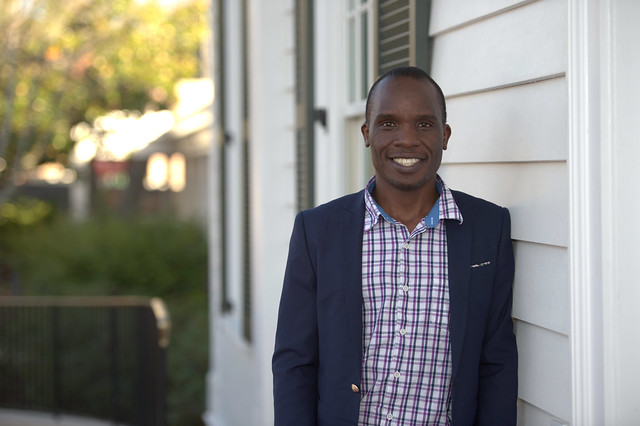Doctoral student representing Auburn University at Global Food Security Symposium
Article body
Auburn University doctoral student Joel Tumwebaze is leading the fight against hunger not just locally, but on a national scale. He was selected to serve on the Chicago Council on Global Affairs’ Next Generation Delegation – a group of 20 students from across the world who are studying agriculture, food, health and related disciplines. The group will convene at this year’s Global Food Security Symposium in Washington D.C. March 29-30.
As part of the delegation, Tumwebaze will discuss and identify ideas for improved food security and nutritional status globally. His participation will not only bring recognition to his work in the fight against hunger but also to Auburn’s efforts.
"This is an opportunity to get my voice out to the world, to share my ideas about global hunger as well as improve my knowledge," Tumwebaze said. "Hunger is a major issue that requires collaborations and partnerships and my participation will aid in identifying these."
He plans to use his position on the delegation to bring up the idea of creating awareness about food security and nutrition, while also discussing policies related to hunger issues.
"Hunger is persistent in the world because many of us are not aware of its causes and consequences," he said. "Policies set in parts of the world can significantly affect food security in other parts of the world. I want to engage fellow symposium attendees into discussions concerning global policies like food aid, agricultural subsidies and more."
Tumwebaze is working toward his doctorate in nutrition science from Auburn’s College of Human Sciences – a field he chose because he enjoys working with people and seeing his work help to improve their livelihoods.
"Nutrition is one of the few education fields where the results of your efforts are proven without reasonable doubt," he said. "During my undergrad, I was part of a project where we had to use local foods to improve the well-being of the society."
He explained that the results revealed an improved health and nutrition status, giving him motivation to continue with his studies in nutrition.
"Most people struggle with malnutrition not because they do not have the required food but because they lack the knowledge of what to eat," he said. "The same goes for hunger. The world produces more food than we require, but a lot is wasted and then we end up with food insecurity."
Tumwebaze serves as the graduate student representative on Auburn’s Committee of 19 – an organization that leads the war on hunger on Auburn’s campus. That organization falls under the leadership of Auburn’s Hunger Solutions Institute. Tumwebaze said he hopes his participation at the Global Food Security Symposium will bring more attention to the work of Auburn’s Committee of 19.
"Given that the symposium will feature several partners from all over the world, an understanding of global efforts is needed," he said. "Hunger is a major issue that requires collaborations and partnerships, and my participation will aid in identifying these."
Related Media
Media interested in this story can contact Communications Director Preston Sparks at (334) 844-9999 or preston.sparks@auburn.edu.
Auburn University is a nationally ranked land grant institution recognized for its commitment to world-class scholarship, interdisciplinary research with an elite, top-tier Carnegie R1 classification, life-changing outreach with Carnegie’s Community Engagement designation and an undergraduate education experience second to none. Auburn is home to more than 30,000 students, and its faculty and research partners collaborate to develop and deliver meaningful scholarship, science and technology-based advancements that meet pressing regional, national and global needs. Auburn’s commitment to active student engagement, professional success and public/private partnership drives a growing reputation for outreach and extension that delivers broad economic, health and societal impact.





